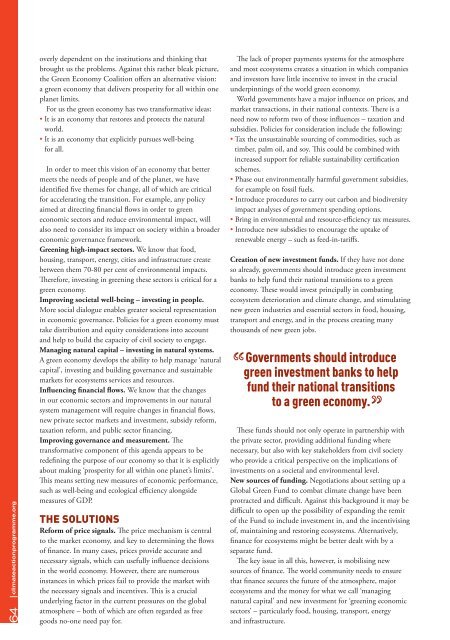Climate Action 2011-2012
Create successful ePaper yourself
Turn your PDF publications into a flip-book with our unique Google optimized e-Paper software.
64 climateactionprogramme.org<br />
overly dependent on the institutions and thinking that<br />
brought us the problems. Against this rather bleak picture,<br />
the Green Economy Coalition offers an alternative vision:<br />
a green economy that delivers prosperity for all within one<br />
planet limits.<br />
For us the green economy has two transformative ideas:<br />
• It is an economy that restores and protects the natural<br />
world.<br />
• It is an economy that explicitly pursues well-being<br />
for all.<br />
In order to meet this vision of an economy that better<br />
meets the needs of people and of the planet, we have<br />
identified five themes for change, all of which are critical<br />
for accelerating the transition. For example, any policy<br />
aimed at directing financial flows in order to green<br />
economic sectors and reduce environmental impact, will<br />
also need to consider its impact on society within a broader<br />
economic governance framework.<br />
Greening high-impact sectors. We know that food,<br />
housing, transport, energy, cities and infrastructure create<br />
between them 70-80 per cent of environmental impacts.<br />
Therefore, investing in greening these sectors is critical for a<br />
green economy.<br />
Improving societal well-being – investing in people.<br />
More social dialogue enables greater societal representation<br />
in economic governance. Policies for a green economy must<br />
take distribution and equity considerations into account<br />
and help to build the capacity of civil society to engage.<br />
Managing natural capital – investing in natural systems.<br />
A green economy develops the ability to help manage ‘natural<br />
capital’, investing and building governance and sustainable<br />
markets for ecosystems services and resources.<br />
Influencing financial flows. We know that the changes<br />
in our economic sectors and improvements in our natural<br />
system management will require changes in financial flows,<br />
new private sector markets and investment, subsidy reform,<br />
taxation reform, and public sector financing.<br />
Improving governance and measurement. The<br />
transformative component of this agenda appears to be<br />
redefining the purpose of our economy so that it is explicitly<br />
about making ‘prosperity for all within one planet’s limits’.<br />
This means setting new measures of economic performance,<br />
such as well-being and ecological efficiency alongside<br />
measures of GDP.<br />
The soluTions<br />
Reform of price signals. The price mechanism is central<br />
to the market economy, and key to determining the flows<br />
of finance. In many cases, prices provide accurate and<br />
necessary signals, which can usefully influence decisions<br />
in the world economy. However, there are numerous<br />
instances in which prices fail to provide the market with<br />
the necessary signals and incentives. This is a crucial<br />
underlying factor in the current pressures on the global<br />
atmosphere – both of which are often regarded as free<br />
goods no-one need pay for.<br />
The lack of proper payments systems for the atmosphere<br />
and most ecosystems creates a situation in which companies<br />
and investors have little incentive to invest in the crucial<br />
underpinnings of the world green economy.<br />
World governments have a major influence on prices, and<br />
market transactions, in their national contexts. There is a<br />
need now to reform two of those influences – taxation and<br />
subsidies. Policies for consideration include the following:<br />
• Tax the unsustainable sourcing of commodities, such as<br />
timber, palm oil, and soy. This could be combined with<br />
increased support for reliable sustainability certification<br />
schemes.<br />
• Phase out environmentally harmful government subsidies,<br />
for example on fossil fuels.<br />
• Introduce procedures to carry out carbon and biodiversity<br />
impact analyses of government spending options.<br />
• Bring in environmental and resource-efficiency tax measures.<br />
• Introduce new subsidies to encourage the uptake of<br />
renewable energy – such as feed-in-tariffs.<br />
Creation of new investment funds. If they have not done<br />
so already, governments should introduce green investment<br />
banks to help fund their national transitions to a green<br />
economy. These would invest principally in combating<br />
ecosystem deterioration and climate change, and stimulating<br />
new green industries and essential sectors in food, housing,<br />
transport and energy, and in the process creating many<br />
thousands of new green jobs.<br />
Governments should introduce<br />
green investment banks to help<br />
fund their national transitions<br />
to a green economy.<br />
These funds should not only operate in partnership with<br />
the private sector, providing additional funding where<br />
necessary, but also with key stakeholders from civil society<br />
who provide a critical perspective on the implications of<br />
investments on a societal and environmental level.<br />
New sources of funding. Negotiations about setting up a<br />
Global Green Fund to combat climate change have been<br />
protracted and difficult. Against this background it may be<br />
difficult to open up the possibility of expanding the remit<br />
of the Fund to include investment in, and the incentivising<br />
of, maintaining and restoring ecosystems. Alternatively,<br />
finance for ecosystems might be better dealt with by a<br />
separate fund.<br />
The key issue in all this, however, is mobilising new<br />
sources of finance. The world community needs to ensure<br />
that finance secures the future of the atmosphere, major<br />
ecosystems and the money for what we call ‘managing<br />
natural capital’ and new investment for ‘greening economic<br />
sectors’ – particularly food, housing, transport, energy<br />
and infrastructure.












